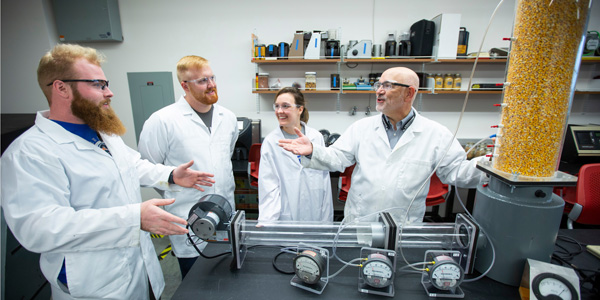
Servant Leader, Engaging Mentor
Tom Brumm makes the most of his 20 percent faculty appointment devoted to service to Iowa State.
The associate professor of agricultural and biosystems engineering extends that commitment to service beyond campus reinforcing George Washington Carver’s observation: “It is simply service that measures success.”
In addition to leadership roles in his department and service to the college and university, he serves as associate director of the Center for Sustainable Rural Livelihoods (CSRL) at Iowa State. In that role, he helps farmers in Uganda keep more of their crops by researching and implementing ways to reduce post-harvest losses.
Steve Mickelson, chair of the Department of Agricultural and Biosystems Engineering, says Brumm excels as a faculty member.
“Dr. Brumm is a servant leader in all he is involved with, both on and off campus. He has made a tremendous impact as chair of the technology curriculum committee by implementing meaningful continuous improvement processes,” Mickelson says. “As a teacher, he has integrated active learning techniques in all the courses he teaches, engaging students in their learning.”
Experimental education
As a scoutmaster for a local Boy Scouts of America troop, Brumm finds opportunities to teach life lessons.
“We put the boys in situations where they get the chance to problem-solve, lead and figure it out on their own,” he says. “Talk about experiential education, this is it.”
As a scoutmaster and faculty adviser for Alpha Phi Omega—a national co-ed fraternity founded to develop friendship, leadership and service to humanity —Brumm has facilitated a Merit Badge University on Iowa State’s campus. Approximately 350 Boy Scouts from troops across central Iowa participated in the 2018 event involving activities to complete merit badges with agriculture and life science connections including animal science, farm mechanics and soil and water conservation.
“My impression is that it was Carver’s approach; that experiential approach: ‘Well let’s try it and see what happens and then talk about it.’ In Boy Scouts or teaching, I use the same approach.”
Last fall, Brumm was in charge of two courses: a course in biorenewables, including biomass and biofuels; and a fundamentals course for sophomores in industrial technology and agricultural systems technology.
He is involved in departure and reflection courses related to the Uganda service-learning program through the Global Resource Systems major, as well as traveling to Uganda with the student service learners. He also provides support for freshman lab courses in the department.
“Teaching’s the fun part; that’s the best part of my job, whether I’m teaching next to a student in a garden in Kamuli (Uganda) or I’m in a classroom here; it’s all fun.”
The self-described “farm kid” from Osage, Iowa, enrolled at Iowa State in 1975. After earning his bachelor’s degree in agricultural engineering in 1979, he came back as a graduate student in 1983 and served as an instructor while working on his doctorate, which he completed in 1990. After working for a seed company for about 10 years, he returned to Iowa State as a faculty member.
Applying research, improving lives
His research related to grain handling and storage helps subsistence farmers in Uganda reduce their grain losses due to insect infestations.
Brumm says it is his work in Uganda that is the most challenging professionally, but also means the most.
“I’ve done research in the past and I’ve improved the efficiency of certain processes, for example, but this the difference of people living well and barely surviving,” he says.
From an engineering perspective, his work in Uganda is challenging because the assumptions engineers and professionals often make in the U.S. don’t work there–from access to technology, to cultural and sociological aspects.
Ugandan farmers lose as much as a third of their crops to insects, mold and other pests. Poor storage of maize produces aflatoxin that causes illness in those who eat it.
“We could increase the food supply by 20 to 30 percent without special seed or fertilizer or mechanization if we just handle the crop better after it’s harvested,” Brumm says.
His research has found sealing grain in air-tight containers eventually suffocates weevils in them.
“To get a container hermetically sealed is difficult. You can’t just put duct tape over the joints and call that good,” he says.
Another project involves disturbing the insects with movement to disrupt their reproduction cycle.
“If we disturb them regularly then they don’t reproduce well. We interrupt their egg-laying cycle, and we interrupt mating. How much to disturb and how often are what we have to figure out from scratch.”
Brumm also is enlisting students in Uganda to design portable seed cleaners and crop dryers, and to improve the existing hand-threshing process.
“I am a visiting professor at Makerere University in the agricultural and biosystems engineering department. The farmers and schools we work with in Uganda are growing more amaranth, but it’s tedious and inefficient to hand thresh,” he says.
A Makerere agricultural engineering student is working with Brumm to build an amaranth thresher for a senior project.
Brumm says he could buy a thresher off the shelf, but that wouldn’t serve the goal of education and would deprive the student of valuable experience. George Washington Carver would likely approve.



